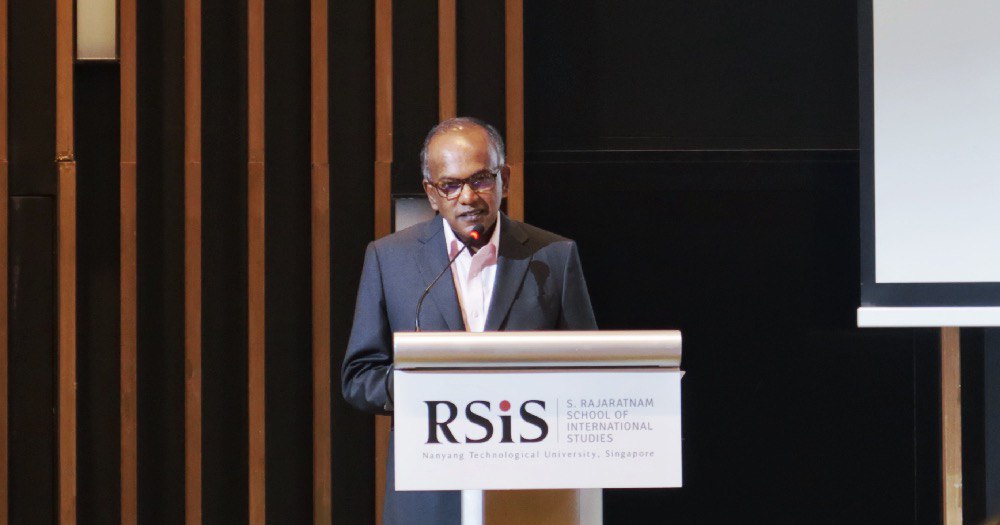Minister for Home Affairs and Law K Shanmugam said that Singapore needed new laws to combat the threat of foreign interference in Singapore's domestic affairs.
Speaking on Sep. 25 at the RSIS conference on Foreign Interference Tactics and Countermeasures, Shanmugam said:
"Every country has the right, the sovereign right, to decide for itself how to protect its national security interests."
Foreign interference is a constant in international relations
Shanmugam explained that foreign interference is nothing new, nor is it unique to Singapore.
Previously, American diplomat Hank Hendrickson attempted to interfere in the 1988 general election.
More recently in 2017, Singapore expelled Huang Jing, a "covert agent of influence" who worked as a professor at the Lee Kuan Yew School of Public Policy (LKYSPP) at NUS.
Turning to the wider region, Shanmugam also cited the example of Hong Kong activists asking politicians in the U.S. to support their cause, as an example of cause-based movements.
Shanmugam explained that states have been known to mobilise activists in order to advance the interests of the foreign country.
Technology makes foreign interference more dangerous
But due to advances in technology, particularly the wide-spread use of the Internet, Hostile Information Campaigns are now much faster and more pervasive.
The face of warfare itself has changed, with such campaigns utilised to sow discord and create internal opposition in a target country, threatening its stability.
On the threat posed by such campaigns Shanmugam said:
"And the fault lines are also exploited by bad actors, both internal and external on hot button issues.
They tap on legitimate sentiments, they target reasonable people, they use legitimate news outlets as conduits, they convert misinformation into mainstream information, they enlist what Lenin famously called "useful idiots" to the cause."
Tech companies can’t be trusted to regulate themselves
Shanmugam disagreed with the notion that tech companies were capable of self-regulation, as their business interests are usually in conflict with that of the broader society.
He pointed out that the business models of companies such as Facebook and Twitter, conflicts with proper self-regulation. He said:
"The more users, the more content there is on their platforms, the more user attention they can sell to their advertisers, the more their profits.
Removing fake users, removing fake accounts, investigating into coordinated inauthentic behaviour, these are all costly."
Shanmugam also brought up an example of Facebook CEO Mark Zuckerburg, who said in March 2019 that regulation was necessary.
However, Zuckerberg added that there must be global standards agreed to by all countries, to which Shanmugam expressed skepticism:
"Do you expect the US, Russia, China, for a start, to sit together and agree on a common standard on what’s not acceptable, and what common standards ought to be?"
Other countries have already passed laws
The minister also pointed out that other countries have already started implementing regulatory laws regarding the spread of information.
For instance, France has introduced an Information Manipulation Law, mandating transparency over social media platforms’ algorithms and election advertising.
This also allows the French national broadcasting agency to suspend any television channels that disseminate false information or are under foreign influence.
Germany has also implemented the Network Enforcement Act, which compels social networks to monitor and remove illegal online content, such as hate speech.
And Australia has also passed a series of laws in 2018, aimed at preventing foreign interference, which includes foreign political donations, espionage laws, and tougher penalties against such acts.
Singapore needs the right tools
Shanmugam added that it was necessary for Singapore to put in place legislative measures to counter foreign interference and be able to intervene, investigate and "respond expeditiously to HICs."
Shanmugam said that "states cannot take a hands-off approach", adding:
"This is an issue of sovereignty and national security. The governments have to lead from the front, and we need to ensure that we have the right tools to fight this threat."
Related story:
Top image by Rachel Ng.
If you like what you read, follow us on Facebook, Instagram, Twitter and Telegram to get the latest updates.
